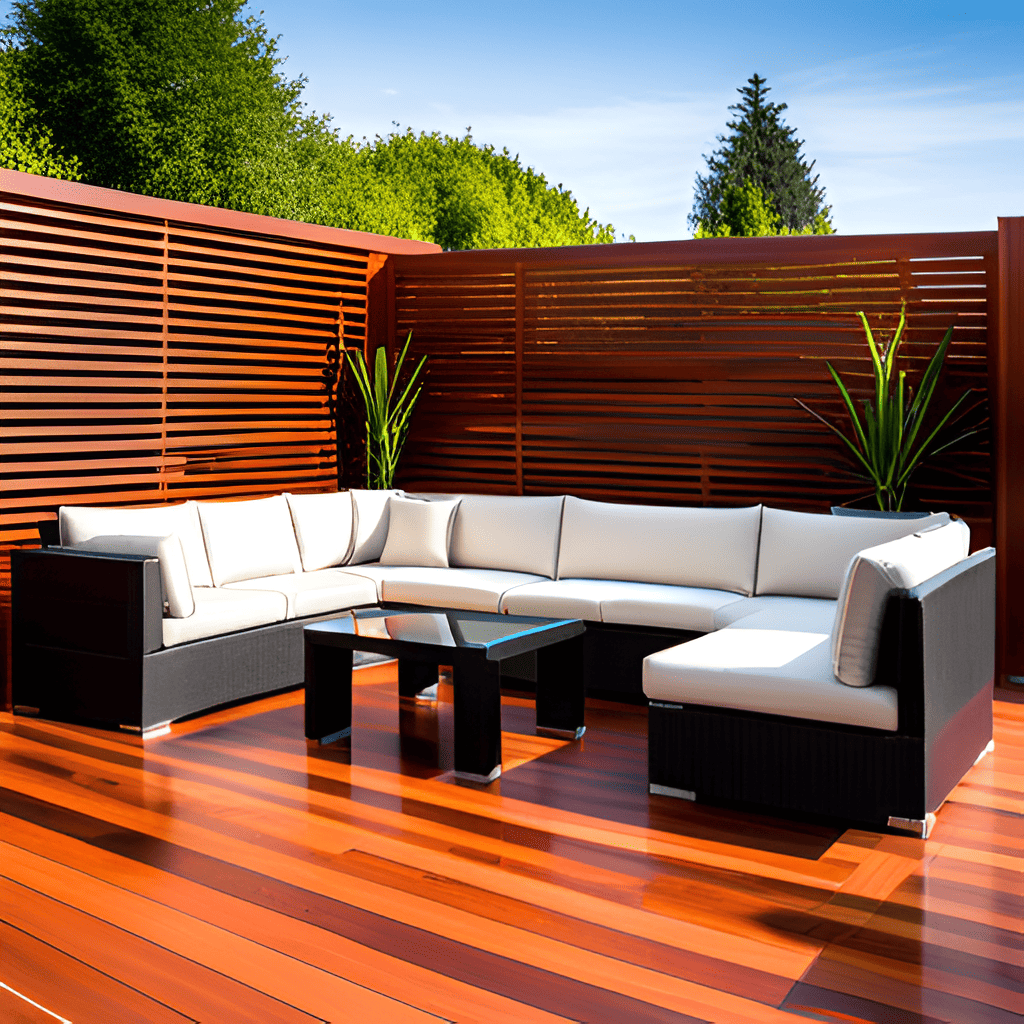Massaranduba wood, also known as Brazilian Redwood or Bulletwood, is a versatile and durable hardwood used for various applications.
As we’ll see below, the wood is very versatile for both indoor and outdoor applications.
Massaranduba Wood Is Used Indoors And Outdoors
Some common uses of Massaranduba wood include:
- Outdoor Decking: Massaranduba wood’s natural resistance to decay and insects, along with its durability, makes it an excellent choice for outdoor decking.
- Exterior Cladding: The wood’s attractive appearance and weather-resistant properties make it suitable for exterior cladding on buildings.
- Furniture: Massaranduba wood is used in crafting outdoor furniture pieces like benches, tables, and chairs due to its strength and resistance to weather.
- Railroad Ties: The wood’s durability and strength make it suitable for railroad ties and sleepers.
- Bridge Construction: Massaranduba wood is used for bridge construction, especially for components that require high strength and stability.
- Marine Applications: Its resistance to water and marine borers makes it a suitable choice for marine applications such as piers, docks, and boat building.
- Posts and Poles: Massaranduba wood is utilized as fence posts, utility poles, and structural support beams.
- Outdoor Structures: It is used in constructing pergolas, gazebos, and other outdoor structures due to its long-lasting properties.
- Landscaping: Massaranduba wood is employed in landscaping projects, including retaining walls and outdoor structures.
- Industrial Flooring: Its high density and durability make it suitable for industrial flooring and heavy-duty applications.
Sourcing Massaranduba For Your Wood Projects
To source Massaranduba wood, you can explore the following options:
- Local Lumberyards or Wood Suppliers: Check with local lumberyards or wood suppliers that specialize in exotic hardwoods. They may have Massaranduba wood available or can help source it for you.
- Online Retailers: Many online retailers and specialty wood suppliers offer Massaranduba wood for purchase. Look for reputable sellers with good customer reviews and verified sources.
- Direct Import: If you are in a region close to South America, particularly Brazil, where Massaranduba is native, you may consider importing the wood directly from sustainable sources. Ensure compliance with international trade regulations and proper documentation.
- Reclaimed or Salvaged Wood: Sometimes, Massaranduba wood may be available as reclaimed or salvaged material from old structures or projects. Check with salvage yards or reclaimed wood dealers for potential availability.

Interesting Facts And Figures About Massarandubaa Wood
Here’s a table with 15 interesting and important characteristics of Bongossi trees and wood:
| Aspect | Description |
|---|---|
| Tree Name | Bongossi (Lophira alata) |
| Tree Height | Can grow up to 40-50 meters (131-164 feet) |
| Trunk Diameter | Large trunk diameter, up to 1.5 meters (5 feet) |
| Growth Environment | Native to tropical regions in West and Central Africa |
| Wood Color | Heartwood ranges from reddish-brown to dark brown |
| Wood Grain | Interlocked or irregular grain pattern |
| Density | Very dense hardwood with a density of about 900-1,100 kg/m³ (56-69 lbs/ft³) |
| Durability | Highly durable and resistant to decay, termites, and marine borers |
| Workability | Considered moderately difficult to work with |
| Stability | Exhibits good dimensional stability |
| Finishing Qualities | Finishes well, with natural oils present in the wood |
| Natural Resistance | Naturally resistant to weather, fungi, and insects |
| Odor | Bongossi wood has a distinct, aromatic odor |
| Fire Resistance | Known for its fire-resistant properties |
| Common Uses | Marine construction, bridge building, railroad ties, heavy construction, decking, fencing, outdoor furniture, utility poles, etc. |
Substitutes For Massaranduba Wood
As for substitutes, several hardwood species can be considered as alternatives to Massaranduba wood for various applications. Some possible substitutes include:
- Ipe (Tabebuia spp.): Ipe wood is known for its similar durability and resistance to decay, making it a potential alternative for outdoor decking and furniture.
- Cumaru (Dipteryx odorata): Cumaru wood shares similar characteristics with Massaranduba, including strength and weather resistance, making it a suitable substitute for outdoor projects.
- Greenheart (Chlorocardium rodiei): Greenheart wood is another durable option for marine and heavy construction applications, similar to Massaranduba.
- Balau (Shorea spp.): Balau wood possesses similar properties to Massaranduba, making it a potential substitute for decking and outdoor structures.
- Garapa (Apuleia leiocarpa): Garapa wood offers good durability and an attractive golden-brown color, making it an alternative for outdoor applications.
- Tigerwood (Astronium spp.): Tigerwood has comparable durability and a distinct striped appearance, suitable for outdoor decking and cladding.
When considering substitutes, it is essential to evaluate the specific project requirements, desired properties, and availability of alternative wood species in your region. Consulting with wood experts or suppliers can help you identify the most suitable substitute based on your needs and budget.
Additionally, ensure that any wood you choose is sourced sustainably and ethically.
Final Thoughts
Bongossi (Lophira alata) is a dense and durable hardwood indigenous to West and Central Africa. Its impressive strength, natural resistance to decay, and fire-resistant properties make it a preferred choice for various demanding applications, including marine construction, heavy construction, decking, and utility poles. The wood’s rich reddish-brown color and distinct aromatic odor add to its appeal in outdoor and structural projects.
Its natural resistance to decay and insects reduces the need for chemical treatments, making it an environmentally-friendly option for outdoor applications.

